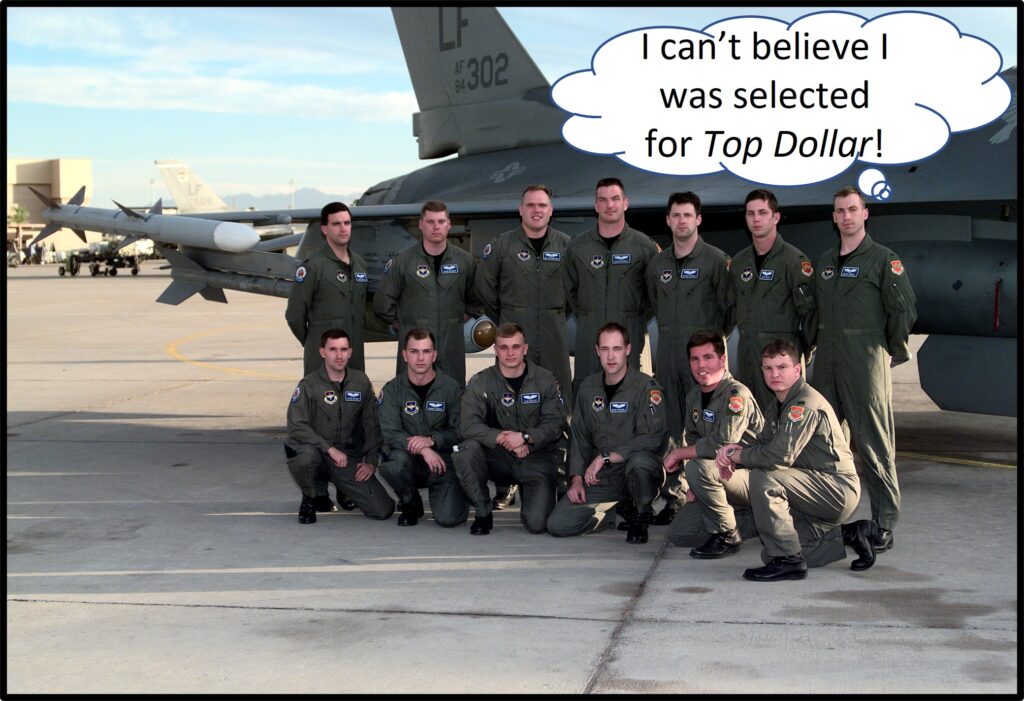Top Financial Lessons from Top Gun: Maverick
I owe a lot to the original Top Gun—my fighter career, my patch, and a couple thousand hours slipping the surly bonds. When I saw Top Gun: Maverick the first time this summer, I didn’t give much thought to how Maverick’s exploits might help us max perform our money and our lives. Fortunately, I got to watch it again this weekend and had a few extra brain bytes to notice some DFPs… (debrief focus points)
Warning—this is the highway to the spoiler zone. If you haven’t seen the movie, turn off your internet machine and proceed to the nearest theater at Mach 2 with your hair on fire.
Lesson 1: When you win the game, quit playing
Ever notice how the Superbowl winning team doesn’t line up for another snap after the clock hits 0:00? When your hypersonic test jet hits Mach 10.0 and you only needed to hit Mach 10.0 to win… don’t press your luck.
If you’ve gotten lucky with an investment, say an undiversified holding in a stock, some crypto asset, or even with a real estate holding that has outperformed the return you needed from it… should you press for Mach 10.1? If you’ve reached financial independence with a higher risk asset allocation, but a lower risk asset allocation will support your future needs, why press for Mach 10.2?
Investing should be a calculated activity that considers risk, needed return, time horizon, and many other constraints. Speculating is hoping that an investment outcome will occur despite the lack of fundamental analysis needed to expect the outcome. Maverick had an aircraft built to a Mach 10.0 specification, it was an investment to attempt Mach 10.0, it was a speculation to try for 10.1.
Chances are that a safe landing after the Mach 10.0 run wouldn’t have resulted in being met with armed security forces. Be careful that investing doesn’t become speculation—you can get met with a lot of red ink or worse!
Lesson 2: The Big Stud doesn’t need the newest toys
Geezer Maverick still rides his ancient motorcycle from 1986, he’s restoring a P-51 that’s about 80 years-old, his cell phone appeared to barely transcend the year 2010, and his credit card apparently got over-G’d due to deferred maintenance. Still, anyone not want to be him?
Stuff is just stuff. It doesn’t define us but too much of it holds us back from the things that really matter in life. Maverick didn’t need a flashy new car or motorcycle and didn’t seem too worried about other material status symbols, but he did get to focus on what mattered most to him without much apparent financial worry. (Granted, the movie would have had a hard time weaving in a scene where Maverick alibi’s to Warlock that he’s late to the brief because of an extended hold time phone call with his credit card company…)
Money is just like time—a finite resource that we deploy to meet our needs, wants, and goals. Until we prove the feasibility of bringing stuff with us to the afterlife, it’s probably better to avoid lifestyle creep with too many extra toys that prevent adequate saving for the future.
Lesson 3: Your Ego is Writing Checks your Body Net Worth Can’t Cash!
As Mav basks in the opportunity to reattack a future with Penny, he loses SA (situational awareness) and leave his phone on the bar. Rookie mistake! Did Mav’s ego as the guy who always gets the girl blind him to the threat of buying a round for the whole bar? Did his ego make him think he only needed one source of payment when he walked into a Fighter Bar?
Ouch! Not only did he earn the right to buy everyone a drink, but he also got unceremoniously catapulted off the deck for not being able to pay when his card didn’t work. It wasn’t exactly Cersei’s walk of shame, but it’s not how the ace of the base wants to be treated either.
Our egos invite us to buy houses that we’re just sure will turn into great investments. Our egos invite us to speculate in crypto, meme stocks, and even single stocks with outsized portions of our nest eggs. Our egos tell us we don’t need an emergency fund because we can just load up our credit cards when the time comes. To paraphrase Warren Buffet, when the tide goes out you can tell who’s been skinny-dipping.
Rules of thumb such as:
- Rent if you won’t be in the house 5 years
- The rent should be 1% of the purchase price
- Don’t speculate with more than 5% of your investable assets
- Save 10%-20% of your income for retirement
- Buy Term and invest the rest
- Three to six months of cash for an emergency/contingency fund
are not Notes, Cautions, and Warnings as they’re not written in the blood of fallen comrades, but they are wisdom written in the tears of regretful families that may have let their ego write some checks that their net worth couldn’t cash.
Lesson 4: The Hard Deck Exists for Your Safety and That of Your Team!
Rooster and Mav tempted fate with a rolling scissors from the fight’s on down to the dirt. I’m pretty sure they did not comply with LOWAT training rules and I hope no one revises their interpretation of the time-to-die charts for altitude and dive angle based on that scene. This was not a rational act for either of them. Continuing their irrational game of chicken nearly killed them both.
John Maynard Keynes reminds us that “The market can stay irrational longer than you can stay solvent.” When we make a bad investment or other financial decision, an army of thinking biases nudge us to continue irrational behavior:
Sunk Cost Fallacy: We continue to hold a speculative asset that’s lost much of its value, despite knowing that we could make better use of the sale proceeds. We’ve endured the cost of sinking our money into the investment, we should ride it out.
Anchoring: We can’t make ourselves sell a mutual fund until its price recovers at least to the initial price. We’re anchored on the original price without evidence that it’s a realistic price for the asset.
Loss Aversion: We anticipate the pain of losing will be much worse than the elation of winning. The market is down and might decline further. We have 25 years until retirement, but we can’t bring ourselves to invest when we might suffer temporary paper losses.
The Decision Lab has a great list of all the ways that our brains muck up our chances for acting rationally with our finances. While a bad financial decision doesn’t usually have the same Pk as an unplanned impact with a planet, it still hurts. Can we avoid such bad decisions with better thinking and awareness of our thinking biases?
Lesson 5: Hangman—“I am good!”
Hangman deserved a sock party for his antics throughout the movie, apart from saving Mavrick and Rooster’s bacon towards the end. His character was toxic from the word go, and frankly, life is too short to suffer people like that. Why is it so hard for people to buy into Humble, Credible, Approachable?
If you’re really good at your craft, people know it and you don’t have fighter pilot-splain it to them. Regardless of whether or not you’re good, if you shred the fiber of teams with your ego and divisiveness, the type of following you’ll develop is probably best characterized as: those who would not pee on you if you were on fire.
If you work for such people, do what you can to get away as quickly as possible. Life is too short to suffer toxic personalities if there are any other options.
Lesson 6: Fighter Jet Movies Need Beach Scenes Because…
Thankfully, we didn’t get overdosed on a reprisal of 2v2 oiled-up beach volleyball. But the simultaneous offense-defense game was the turning point for the candidates—they finally started to act like a team.
There’s an irony in most real-life competitions—they’re really 1v1, but a team helps. The financial pornography industry (read: Cable TV) wants us to feel like we must beat the market. The thing we really need to beat is our own worst tendencies which is a 1v1 competition. (See Lesson 5 above.)
While it’s ultimately up to us to make smart decisions and execute them, having a team helps. For married couples, the best team member is the spouse. Both spouses need to practice unity of effort towards shared goals. Other team members might be useful too such as:
- Enrolled Agent or CPA to signature-manage this year’s taxes (maybe last year’s too).
- Investment manager or “Robo” Investment Service so you can load-shed the time and effort of rebalancing and tax-loss harvesting.
- Financial Planner to give you fiduciary advice (with minimized conflicts of interest) about how to integrate all elements of your financial planning.
- Estate Attorney / JAG to prepare or refresh your Will, Living Will, Healthcare Power of Attorney, Durable/Springing Power of Attorney, and potentially a Revocable Living Trust.
The basics of live within your means and pay yourself first by investing every month are a 1v1 competition. For the more complex fights that look like an attack on the Death Star in F/A-18s, you might want to build a team of professionals to help.
Lesson 7: Acceptable Level of Risk (ALR)
The attack on the anonymous enemy country (that just happens to fly F-14s and be developing nuclear weapons…) had an ALR of Ludicrous at the onset of mission planning. The brass barely put a fig leaf over their willingness to sacrifice the aircrew and jets if the target could be destroyed. Maverick took a different approach to the risk: mitigate it with bleeding edge training and team building.
There are more types of investing risk than you have patience to read about in this article, but let’s look at some of the marquee risks:
Business risk—The company you’re investing in might be run into the ground or get out-competed
Interest Rate risk—Changes in interest rates could wreck the value of bonds and make company expenses soar
Legislative risk—Congress could paint current crypto assets into a coffin corner
General Price Volatility—The price of your investment will change for various reasons, and you might need to sell while it’s depressed
Country risk—The People’s Democratically Republic-ish of ________ nationalizes the company you invested in, destroying the value of the stock
Before deploying our dollars on a mission, we must evaluate all of the types of risk and decide how much we can accept. When we invest, we need to fully understand our:
- Risk Tolerance—how well do you sleep at night when your investment loses value, even if it’s temporary
- Risk Capacity—If the investment loses value, can we still accomplish our goals such as funding college and eating human food during retirement?
Lesson 8: Canopy, Visor, Mask…
Setting aside that getting skewered at low altitude doesn’t allow a lot of time for the post-ejection checklist—Canopy, Visor, Mask, Seat-Kit, LPU, 4-Line Mod, Steer, Prepare, and Land (for those that haven’t had the pleasure of memorizing those lifesaving steps), Maverick landed with his mask still attached. This could be lethal if he landed in water and hazardous in myriad other ways with trees and such. (He probably could have severed his seat kit too…)
When things go plaid, we need to have a plan. Pilots are used to memorizing critical procedures to cope with the most time-sensitive contingencies. Those procedures are a plan for what do to when there’s no time to make a plan.
Most financial problems don’t require split-second reflexes and memorization of procedures such as:
- INVESTMENTS – Hold
- TAX-LOSSES—Harvest
- ASSET ALLOCATION—Rebalance
But having a plan for what to do when your financial world seems to have experienced catastrophic fan blade liberation or some such calamity is crucial to making sound decisions.
The no-plan gameplan for investing often looks like Buy High, Sell Low. It’s one thing to know that it’s supposed to be the other way around, it’s another to know what steps you’ll actually implement in troubled times, such as:
- DOLLAR-COST AVERAGE—Continue
- EXTRA CASH—Invest
- EMERGENCY FUND—Maintain
We think through and practice our post-ejection checklist at 1G and zero knots so we can perform it at 9Gs and 800 knots. We should think through our bear market plan when the bulls are tearing it up, not the other way around.
Cleared to Rejoin
Top Gun: Maverick was an exceptional movie and I continue to wish the Air Force would get its act together and produce an equivalent. In the meantime, Maverick doesn’t just teach us how to be the best of the best and “if you think, you’re dead,” his valedictory trip back to the skies can teach us how to get our name on the right trophy—Top Dollar!
Fight’s On!
Winged Wealth Management and Financial Planning LLC (WWMFP) is a registered investment advisor offering advisory services in the State of Florida and in other jurisdictions where exempted. Registration does not imply a certain level of skill or training.
This communication is for informational purposes only and is not intended as tax, accounting or legal advice, as an offer or solicitation of an offer to buy or sell, or as an endorsement of any company, security, fund, or other securities or non-securities offering. This communication should not be relied upon as the sole factor in an investment making decision.
Past performance is no indication of future results. Investment in securities involves significant risk and has the potential for partial or complete loss of funds invested. It should not be assumed that any recommendations made will be profitable or equal the performance noted in this publication.
The information herein is provided “AS IS” and without warranties of any kind either express or implied. To the fullest extent permissible pursuant to applicable laws, Winged Wealth Management and Financial Planning (referred to as “WWMFP”) disclaims all warranties, express or implied, including, but not limited to, implied warranties of merchantability, non-infringement, and suitability for a particular purpose.
All opinions and estimates constitute WWMFP’s judgement as of the date of this communication and are subject to change without notice. WWMFP does not warrant that the information will be free from error. The information should not be relied upon for purposes of transacting securities or other investments. Your use of the information is at your sole risk. Under no circumstances shall WWMFP be liable for any direct, indirect, special or consequential damages that result from the use of, or the inability to use, the information provided herein, even if WWMFP or a WWMFP authorized representative has been advised of the possibility of such damages. Information contained herein should not be considered a solicitation to buy, an offer to sell, or a recommendation of any security in any jurisdiction where such offer, solicitation, or recommendation would be unlawful or unauthorized.






